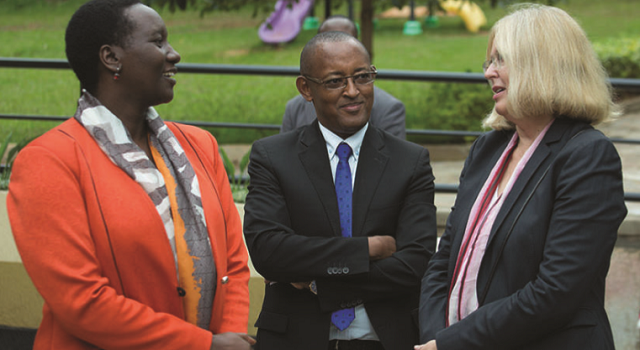
Rwanda hosts experts meeting in bid for UNESCO Heritage status
Rwanda needs to closely involve local communities in the management and interpretation of `Sites of Memorial of Genocide’ in the country. This recommendation is one of many made during the recent international experts meeting on the World Heritage Convention and Memory Sites held in Kigali from Nov.7 to 9.
The experts also advised the Rwanda government to closely involve communities in the preparation of a nomination file for the sites to be accorded World Heritage Status by UNESCO.
The experts said the need to involve communities in these activities was demonstrated through the case studies shared by the experts from South Africa, Senegal and Mali.
The Minister of Sports and Culture, Julienne Uwacu assured participants that Rwanda was committed to preparing a successful nomination file to ensure World Heritage status for the Sites of Memorial of Genocide.
During the three-day convention, participants visited Murambi and Nyamata memorial sites. These are two of the four ‘Sites of Memorial of Genocide: Nyamata, Murambi, Bisesero and Gisozi’ included as one serial site on Rwanda’s Tentative List for potential World Heritage Listing.
Minister Uwacu informed participants of the national authorities’ willingness to consider nominating other heritage sites in Rwanda that could be worthy of World Heritage status such as the volcanoes and gorilla habitats bordering the Democratic Republic of the Congo.
The National Centre for the Fight Against Genocide (CNLG), the Ministry of Sports and Culture of Rwanda and UNESCO organised the experts meeting.
They were supported by the African World Heritage Fund (AWHF).
Over 50 participants, including the Executive Secretary of the CNLG, university professors and researchers, NGOs and other stakeholders from civil society attended the workshop.
They were joined by the Director of the UNESCO World Heritage Centre, representatives from the International Council on Monuments and Sites (ICOMOS) and the AWHF as well as World Heritage experts from South Africa, Mali and Senegal to reflect on sites of memory in the framework of the 1972 UNESCO World Heritage Convention.
Case studies from Robben Island and Island of Goree World Heritage sites were considered alongside examples from UNESCO’s Memory of the World Programmeand the International Coalition of Sites of Conscience.
The Director of the World Heritage Centre presented the history of memory sites linked with the World Heritage Convention such as Auschwitz Birkenau German Nazi Concentration and Extermination Camp (1940-1945) in Poland and Hiroshima Peace Memorial (Genbaku Dome) in Japan as well as past World Heritage Committee decisions and outcomes of experts’ meetings.
Her presentation shed light on the complexities involved with places of memory and site interpretation. The AWHF gave a detailed presentation on the World Heritage nomination process. ICOMOS reviewed the concept of “Outstanding Universal Value” in the context of the World Heritage Convention as well as the six criteria possible for the nomination of cultural World Heritage sites. Participants learned about the ICOMOS Charter on the Interpretation of Cultural Heritage Sites, and the critical need for a comprehensive “comparative analysis” of sites as part of the World Heritage nomination process.
Following the discussions, the CNLG and UNESCO presented draft recommendations from the workshop. These included the need to form a steering committee to focus on the most appropriate way forward for the Sites of Memorial of Genocide; ensuring full legal protection and management for the sites; integrating genocide education into national curriculum; reaching out to new partners and donors for an interdisciplinary and inter-generational approach to memory heritage; and involving the multiple voices of local communities as well as the diaspora in site interpretation and safeguarding.
****
editor@independent.co.ug
 The Independent Uganda: You get the Truth we Pay the Price
The Independent Uganda: You get the Truth we Pay the Price



